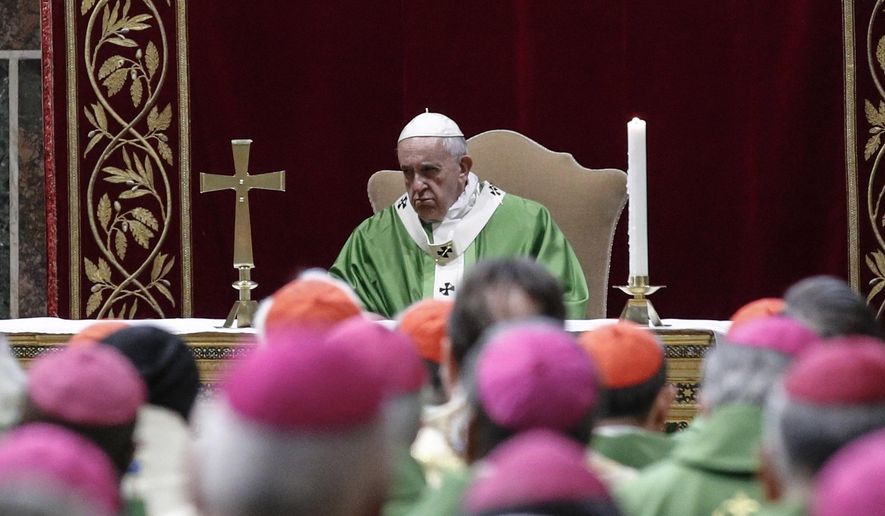Pope Francis closed his unprecedented summit on preventing clergy sex abuse Sunday by vowing to confront abusers with “the wrath of God,” but he did not offer any concrete protocols, an absence that won’t be missed by critics and victims, alike.
“We need to recognize with humility and courage that we stand face-to-face with the mystery of evil, which strikes most violently against the most vulnerable, for they are an image of Jesus,” the pope said at the Vatican.
Francis delivered his remarks at the end of Mass before 190 Roman Catholic bishops and religious superiors who were summoned to Vatican City after several series of sex abuse cases had rocked the church, including the revelation that former cardinal Theodore McCarrick, a popular U.S. archbishop who had been front-and-center in the mid-2000s with the church’s response to sexual abuse was an abuser himself.
On the eve of the summit, the Vatican defrocked Mr. McCarrick, stripping him of his ministry and ordination.
Francis’s summit got underway Thursday and included testimonies from victims, senior clergy, a journalist, and “working groups” in which participants discussed the way forward.
Early on, however, it appeared that getting all parts of the worldwide church on the same page would prove difficult. Australian Archbishop Mark Coleridge said during a press briefing Thursday that some bishops from Africa wondered why the church was engaging with sexual abuse when other kinds of abuse in their home nations — such as the plight of child soldiers — is a greater concern.
When pressed by a reporter who noted that the Vatican did not employ child soldiers and that sexual abuse had come at the hands of church fathers, Archbishop Coleridge retrenched.
“There wasn’t an opportunity in the discussion to reply,” said the archbishop. “It will be taken into the discussion that happen this afternoon and the day after.”
Another source of conflict was the terminology in the meeting’s title. Some critics had wanted the meeting to focus on not only “the protection of minors” but also “vulnerable adults.” They see a link between abuse against children and the covert sexual relationships between clergy and seminarians.
During Friday’s press conference, Boston Cardinal Sean O’Malley used the phrase “and vulnerable adults” in describing the focus of the ongoing conference, even though that language did not appear anywhere on official documents.
“There’s nothing more urgent for the Church to do than to come together and come up with a way to address what is the most important part of our mission at this point in history,” Cardinal O’Malley said.
In the summit’s closing event, Pope Francis offered an eight-point pledge of priorities going forward, calling for a change in the church’s defensive mentality and a vow to never again cover-up cases. Victims, he said, must take center stage while priests must undergo a continuing path of purity with the “holy fear of God” guiding the examination of their own failures.
“In people’s justified anger, the church sees the reflection of the wrath of God, betrayed and insulted by these deceitful consecrated persons,” he said.
One surprise at the outset of the meeting was an issuance of 21 reflections by the pontiff, including one that would universalize 16 age of consent for marriage for both boys and girls. Currently, the church’s canon law says the age of consent is 14 for girls and 16 for boys, though various bishops conferences and dioceses have raised the age to 16 for everyone.
• This article is based in part on wire service reports.
• Christopher Vondracek can be reached at cvondracek@washingtontimes.com.




Please read our comment policy before commenting.